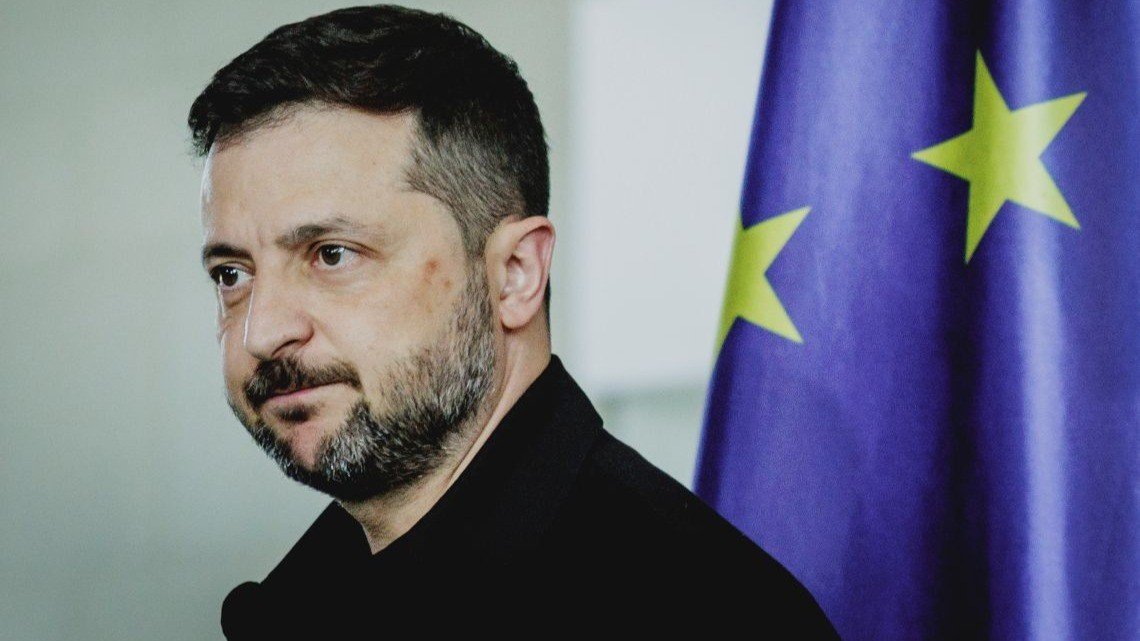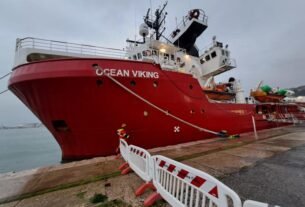Good morning and welcome back to the Capitals. After a two-week break, we’re refreshed and ready for the rentrée.
This is Eddy Wax, with Nicoletta Ionta. Story ideas are welcome by email – or, for the more discreet, via Signal at @EddyWax.94
In the Capital
Ever since Russia’s full-scale invasion, Europe’s political class has feared that public opinion would sour on Ukraine, weighed down by populist narratives about the economic cost of support and the burden of millions of refugees.
That shift has not materialised.
Now they worry about something just as disquieting: that Ukrainians themselves might begin to doubt Europe’s promises.
Lithuania, one of Kyiv’s most vocal advocates, has warned other EU governments that “tangible progress” on Ukraine’s membership bid is essential if Brussels is to maintain credibility, according to a memo circulated to capitals around the bloc and seen by The Capitals.
Negotiations have stalled since June, Vilnius wrote, and the EU’s “failure to reciprocate Ukraine’s expectations and implemented reforms” has already been used by domestic and foreign bad actors to undermine Kyiv’s confidence in Europe.
The remedy, Lithuania stated, is simple: move forward. Denmark should convene talks in Copenhagen in early September to open negotiations for Ukraine – and Moldova – as a 26-strong bloc if Hungary refuses to join. “It would convey a clear message that Ukraine’s and Moldova’s European path remain a priority for the EU,” the document said.
The obstacle is Viktor Orbán, who has wielded a veto on Ukraine’s accession for months.
Lithuania’s document hints at a wish for political change in Hungary. Without mentioning names or countries, it proposes continuing legal work regardless and formalising membership once “EU27 support is rebuilt.” That phrase is coy shorthand for Hungary’s 2026 election, when Orbán faces a challenge from Péter Magyar.
Ukraine, which gained candidate status in 2022, has advanced reforms on its judiciary, oligarchs and minority rights to bolster its EU bid – though not without setbacks. Most recently, the government restored its anti-corruption agencies after public outcry and pressure from Brussels over an attempt to curb their independence.
For Vilnius, the stakes are personal. Shaped by Soviet occupation and sharing a border with Russia, it views Ukraine’s survival as integral to its own security.“Your victorious fight … will be written into history textbooks for thousands of years to come,” EU Defence Commissioner Andrius Kubilius, who is Lithuanian, told Ukrainians gathered outside the European Parliament in celebration of the country’s 1991 independence over the weekend. Ukraine’s Ambassador to the EU Vsevolod Chentsov also voiced confidence that Kyiv would soon become a member of the bloc.
Yet enlargement is only one front. Europe’s leaders have been preoccupied with transatlantic diplomacy, recently visiting Washington to garner post-war security guarantees for Kyiv and restrain Donald Trump from siding with Russian President Vladimir Putin.
Meanwhile, President Volodymyr Zelenskyy on Sunday called for Putin to meet him for peace talks. Ironically, Budapest – the capital blocking Ukraine’s accession – has been floated as a possible venue for the meeting, which could involve Trump as well, as my colleague Magnus Lund Nielsen writes here.
Von der Leyen sells her deal as Draghi slams it
Ursula von der Leyen has taken to the Spanish press to defend her tariff deal with the US. In a rare op-ed published in El Mundo on Sunday (who knew her Spanish was so good?), the Commission president called the agreement a “deliberate” move to avert a trade war, and argued that the EU is the only trading partner to secure a single capped tariff rate (of 15%) on its exports to America.
Only Russia and China would have been celebrating if no deal had been reached, she said. Euractiv’s Emma Pirnay unpacks the key takeaways from her column here, in English.
Von der Leyen’s attempt to sell the deal – fleshed out in a joint statement last week – came after criticism from one of her top economic advisers of recent years, Mario Draghi. On Friday, the former Italian PM delivered a scathing critique of the EU at the Rimini Meeting, an annual Catholic-inspired gathering that attracts Italy’s political and business elite.
Draghi warned that Europe’s economic heft no longer guarantees geopolitical power. “This year will be remembered as the year that illusion evaporated,” he said, pointing to the EU-US trade deal. On Ukraine, on Gaza, on Iran, Draghi portrayed a Europe watching from the stands while others determine the outcome. He insisted that only deeper EU integration could restore the bloc’s sway in the world.
Italy’s PM Giorgia Meloni will close the event in Rimini on Wednesday.
France faces online protest threat
Mark September 10 in your calendar.
A viral “block everything” campaign could hit France, backed by left-wing activists and railway workers union Sud-Rail, piling fresh pressure on PM François Bayrou’s shaky government.
Born on TikTok but turbo-charged by Jean-Luc Mélenchon’s La France Insoumise party, the protest push has gained traction since Bayrou’s July announcement of €44 billion in budget cuts, and ministers are now scrambling to head off another season of blockades and strikes.
As of Monday, roughly 10,000 people were following the movement’s Facebook and Telegram channels. Its demands remain vague or scattered – from pay rises to the resignation of the government – as do the tactics, which range from strikes and supermarket boycotts to roadblocks and even calls to occupy ports and public buildings. Euractiv’s Elisa Braun and Laurent Geslin take a closer look at the movement’s rise here.
The capitals
THE HAGUE: Dutch Foreign Minister Caspar Veldkamp resigned on Friday after failing to win cabinet backing for new sanctions against Israel, prompting his party to abandon the coalition. The move heightens political instability in the Netherlands ahead of October’s elections, while underscoring the EU’s continuing failure to forge a common line on Israel’s conduct in Gaza, where the UN has now declared a famine.
ROME: Italy’s coalition tensions spilled into foreign policy over the weekend, as Foreign Minister Antonio Tajani sought to distance Rome from Deputy PM Matteo Salvini’s escalating feud with Paris. France summoned Italy’s ambassador after Salvini ridiculed Emmanuel Macron’s call for EU troops in Ukraine, remarks Tajani countered with a plea for diplomacy “through the strength of ideas.” The episode risks unravelling months of repair work by Meloni.
PARIS: Last night, France also summoned US Ambassador Charles Kushner over his op-ed accusing Macron’s government of failing to combat antisemitism, a clash deepened by Paris’ recognition of a Palestinian state. “The ambassador’s allegations are unacceptable,” the French foreign ministry said of the remarks made by Kushner, the father of Trump’s son-in-law.
BRUSSELS: A stabbing here left one person critically injured last night following a pro-Palestinian protest. Police confirmed an arrest but have not yet released details about a motive.
WARSAW: Most Poles – about 71% – oppose awarding Trump the Nobel Peace Prize, according to a poll by SW Research, while only roughly 11% believe that the US president deserves the distinction. Trump was nominated by Republican lawmaker Darrell Issa, who cited his “contribution” to conflict in the Middle East.
LONDON: Former Brexit campaigner Nigel Farage has laid out plans for “mass deportations” of migrants if his Reform UK party takes power. In an interview with The Times of London, Farage said he would pull Britain from the European Convention on Human Rights and sign deals with Afghanistan, Eritrea and others to repatriate Channel arrivals.
Also on Euractiv
French streamer’s death tests EU law
The death of French streamer Raphaël Graven, who live-streamed his own decline over nearly 300 hours on the permissive platform Kick, has turned into a grim case study of Europe’s online content moderation rulebook.
Though the Digital Services Act was designed to give regulators teeth, no authority stepped in. Kick was too small to be handled by Brussels, too slippery for national regulators to claim responsibility, and for months had no legal presence in Europe at all. In the aftermath, the tragedy has become an emblem of the DSA’s enforcement void – a law with sweeping ambition, but hesitant guardians.
Opinion: Why London and Paris must go further to deter Moscow
With the Northwood Declaration, Britain and France have promised that Europe will not stand alone under nuclear threat.
But words alone will not suffice against a Russia that brandishes low-yield battlefield weapons to intimidate NATO, Juraj Majcin, policy analyst at the European Policy Centre in Brussels, writes in his latest op-ed. In the grey zone between conventional war and full-scale nuclear conflict, Moscow has options; the EU has far fewer.
Read more.
Today’s newsletter was brought to you by:
Eddy Wax & Nicoletta Ionta, with reporting from:
Magnus Lund Nielsen, Bryn Stole, Emma Pirnay, Alexandra Brzozowski, Alessia Peretti, Aleksandra Krzysztoszek
Editors: Christina Zhao






